 |
|||||||||||||||||||||||||||||||||||||||||||||||||||||||||||||||||||||||||||||||||||||||||||||||||||||||||||||||||||||||||||||||||||||||||||||||||||||||||||||||||||||||||||||||||||||||||||||||||||||||||||||||||||||||||||||||||||||||||||||||||||||||||||||||||||||||||||||||||||||||||||||||||||||||||||||||||||||||||||||||||||||||||||||||||||||||||||||||||||||||||||||||||||||||||||||||||||||||||||||||||||||||||||||||||||||||||||
AND REPLY TO THIS 2-MINUTE SURVEY MONKEY! HERE WE GO… |
|||||||||||||||||||||||||||||||||||||||||||||||||||||||||||||||||||||||||||||||||||||||||||||||||||||||||||||||||||||||||||||||||||||||||||||||||||||||||||||||||||||||||||||||||||||||||||||||||||||||||||||||||||||||||||||||||||||||||||||||||||||||||||||||||||||||||||||||||||||||||||||||||||||||||||||||||||||||||||||||||||||||||||||||||||||||||||||||||||||||||||||||||||||||||||||||||||||||||||||||||||||||||||||||||||||||||||

|
||||||
| NEWS about NECE | ||||||
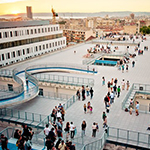 © Caroline Dutrey |
NECE 2018 in Marseilles: Brave New Worlds?! The Future of Democracy and Citizenship Education 6 - 9 September » Registration is open NOW! Liberal democracy is in a state of crisis. Worldwide, a “democratic recession” can be observed, even in countries that have long claimed a leading role in defending and spreading democratic values and freedoms. Uncertainties about the future of the European Union and its transformation into a “Citizens’ Europe” are shaping the run-up to the European Parliament elections in May 2019. (Christoph Müller-Hofstede) |
|||||
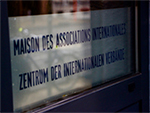 © MAI |
NECE Partners and Advisory Board Meeting on 11 - 12 April hosted by the Maison des Associations Internationales (MAI) in Brussels (Belgium) On 11-12 April 2018, the NECE Partners and Advisory Board Meeting will be hosted by the MAI. By making conference rooms, permanent offices and an incubator available, the Maison des Associations Internationales (MAI) in Brussels, Belgium, is acting as a port of call for citizenship education stakeholders who wish to get in involved in advocacy work with respect to the EU. |
|||||
 |
NECE Workshop on 16 - 17 May in Marseilles (France) This workshop aims to identify the forms and conditions of political-cultural education in France, with particular emphasis on the south of France, whilst bringing together stakeholders from the French political, cultural, educational, scientific and media sectors, in addition to relevant civil-society organisations from the Marseilles region. The findings and experiences of the workshop will be incorporated into the further design of the NECE Conference 2018 in September. |
|||||
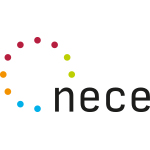 |
bpb Statement to the Public consultation on EU funds in the area of values and mobility This took place as part of the preparations for the Multiannual Financial Framework that will define and shape the EU Budget after 2020. We availed of this the opportunity to register as stakeholders in the field of citizenship education in Europe, promoting NECE and recommendations such as a clearer focus on citizenship education in the ERASMUS+ programme. We consider the consultation as a genuine effort by the Commission to "fish for ideas“ on how to run future programmes. Please consider this as a first step in our advocacy efforts that will be adjusted and fine-tuned in the future. |
|||||
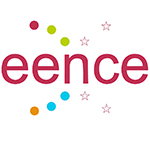 |
From Focus Group to Network: Story of EENCE – a new publication reports on the results of the EENCE’s work in the last years From 30 August to 1 September 2017, 75 participants met in Brussels for the second edition of the summer university on European Citizenship organised by ECIT Foundation (European Citizens’ rights, Involvement and Trust). The main objective was to bring together researchers, civil society representatives and officials to discuss the future directions of European citizenship in the context of the multiple crises facing Europe. The report is a summary of three days of intensive brainstorming, a public debate on the evening of the second day and a number of parallel events organized by partner organisations. In the session “Education for European Citizenship” a representative of NECE (Sigrid Steininger) was given the opportunity the present the network and its various activities as well as to discuss some challenges for citizenship education. Read the full story here. |
|||||
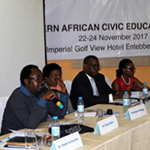 |
NACE's participation at the Eastern African Civic Education Forum 2017, 22 - 24 November 2017, Entebbe, Uganda At this forum, the NACE Steering Committee Members Moez Ali, Tunisia, and Petra Grüne, Germany shared their experience about the benefits of networking and how to establish networks. A discussion also took place on how to promote solidarity among civic-education actors (and their sponsors) and how to enhance south-south exchanges of ideals and experiences with respect to civic education. The participants founded a new network at this conference: CENESA – Civic Education Network for Eastern and Southern Africa. |
|||||
 |
Start of a new network: CENESA – Civic Education Network for Eastern and Southern Africa The network consists of representatives working on democracy and civic education in Malawi, South Africa, Rwanda, Burundi, Tanzania and Uganda, and aims at helping youth empowerment organisations to access political framework bodies such as EU, EAC, Arab League, OECD and to join forces in order to promote civic-education issues across the sub-continent. An Interim Steering Committee (ISC) was appointed to spearhead the creation and materialisation of the Network. The ISC will then be expanded to other countries in the region that are not represented. |
|||||
| VoteMatch preparing for the European parliamentary elections in Spring 2019 VoteMatch Europe will be relaunched on www.votematch.eu in anticipation of the European Parliament elections in Spring 2019. The project partners have already started the initial planning phase and the main goal this time is to connect VoteMatches from all Member States via the platform. Through VoteMatch, citizens eligible to vote and willing to look beyond the nation state and its borders will be able to check which parties from their own country might best suit their political preferences and which parties from abroad are interesting as well. |
||||||
| FACING POLITICS | ||||||
This is a new section of the newsletter where we look at the changing political landscape in Europe for citizenship educators and civil society. |
||||||
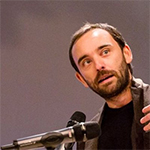 © private |
Statement by Lorenzo Marsili on the Italian parliamentary elections The Italian elections have provided further proof that Europe's political landscape remains in turmoil. This should come as no surprise: established parties are proving dramatically incapable of rising to the grave challenges of our time and unwilling to reform an economic system that excludes a growing percentage of our citizens from decent living standards. Following a familiar trend, parties perceived to be advocating continuity have been punished at the polls. Both the traditional centre-left Democratic Party and the traditional centre-right of Silvio Berlusconi have plummeted in the polls, counting for under 33% between them. The real victors are two allegedly "anti-establishment" parties, the Five Star Movement (32%) and the League (17%). However, whereas the latter is part and parcel of the general European trend towards nationalism and xenophobia, and is a close ally of Marine Le Pen's FN, the Five Star Movement represents a uniquely Italian approach to “centrist” populism. In the run-up to the elections, they proposed moderate candidates for ministerial posts and dramatically toned down their anti-euro rhetoric. The result is a hung Parliament. Which government may emerge is anybody's guess: expect long coalition talks and possible early elections. But, more importantly, the Italian elections bring a further reminder that "things fall apart, and the centre no longer holds". In a situation of great political transformation, with new parties emerging in a very short period of time (from Podemos to En Marche), it is paramount that citizens be informed about political alternatives and even consider playing a direct role in running for elections. Traditional parties face a stark choice: accept the challenge of dramatically reforming Europe's institutions and economy, or wither away and witness continued growth in electoral revolt. |
|||||
| „Is the world getting better or worse?“ Jan-Werner Müller on Steven Pinker’s hotly debated new book “Enlightenment Now. The Case for Reason”
In times declared as being “the end of reason and truth as such”, one does surely well to point out the empirical evidence of constant progress in the history of humanity. Yet “the spirit of the Enlightenment was and remains the spirit of criticism”, argues Jan-Werner Müller in his worthwhile analysis of Steven Pinker’s latest book.
Jan-Werner Müller is a professor of politics at Princeton University and a member of the NECE Advisory Board.
|
||||||
| „Time to elect a European Constituent Assembly“ by Lorenzo Marsili and Niccolò Milanese (member of the NECE advisory Board)
„Rather than put all their hopes in top-down democratic reforms that never come“ – in their latest article published online in the Green European Journal, Niccolò Milanese and Lorenzo Marsili suggest the creation of a European Constituent Assembly that exists outside the existing institutions and engages citizens and civil society in assuming truly democratic responsibility in “a new kind of organisation: a cross between a citizen-led NGO and a democratically elected congress.“ |
||||||
| GOOD PRACTICE: IDEAS & EXAMPLES | ||||||
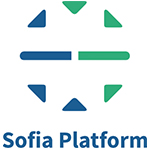 |
“Civic Education in Action” by Sofia Platform: Fostering citizenship education in the Bulgarian school curriculum
Civic education is supposed to be introduced in the Bulgarian school curriculum by 2020. "Sofia Platform" is fostering this process via its current project “Civic Education in Action”. This includes civic-education lectures in high schools as well as developing methodology and training modules for teachers with the help of educational experts. In addition to this, Sofia Platform organises public discussions on topics concerning democracy and the EU. |
|||||
| “Education on Europe” – a new capacity-building programme and collaboration platform for citizenship-education practitioners by the Robert Bosch Foundation
The programme aims to create, pilot and evaluate new approaches that make European integration and EU politics more accessible to people learning about them. It is interested in concepts about how to reach young people, who are not usually targeted by European education programmes. The programme currently consists of 27 projects involving 66 countries. |
||||||
| The Good Lobby: Supporting European NGOs in Lobbying
With respect to the EU instituions, citizens’ literacy is modest, there is little knowledge about the legal framework and there is limited engagement. On the other hand, there are an estimated 30,000 corporate lobbyists dominating EU policy. While NGOs have increasingly been included in those processes, they often are under-staffed and struggle in connecting with citizens. This is why „The Good Lobby“ engages in a series of activities which are all aimed at promoting citizen and civil-society lobbying in the public interest.
Alberto Alemanno, professor of European law in Paris, founder and director of The Good Lobby has been invited to the NECE 2018 conference to give lectures and a workshop.
|
||||||
| POLITICS & POLICIES & CITIZENSHIP EDUCATION | ||||||
| Open letter to the European Commission to call for a European Values Instrument
Triggered by the new anti-NGO legislation in Romania, Liberties is collecting signatures for a letter to urge the European Commission to set up a fund supporting European NGOs, the so-called European Values Instrument. |
||||||
| Call for solidarity against the Polish Holocaust law, by Marta Lempert Polish civil society is appealing for international solidarity against the adoption by the Polish Parliament of a law that would criminalise those who ascribe responsibility or co-responsibility for Nazi crimes to the Polish nation or to the Polish state. |
||||||
| Parliamentary elections: Hungarian Civil Society appeals to OSCE Initiated by the Hungarian Europe Society and its director, Istvan Hegedüs, civil-society organisations recently appealed to Sólrún Gísladóttir, Director of the Office for Democratic Institutions and Human Rights of the Organisation for Security and Cooperation in Europe (OSCE), to extend the engagement of the electoral observation mission regarding the upcoming parliamentary elections in Hungary that will take place on 8 April 2018.
Istvan Hegedüs will be one of the speakers at NECE 2018, Marseille.
|
||||||
| Memorandum: International Symposium “Education for a Europe of Rights”, 1 - 2 December 2017, Budapest (Hungary)
As a follow-up to the international symposium, a memorandum was circulated encompassing four Central European countries (Czech Republic, Hungary, Romania, Slovakia). The paper critically reflects on the current state of human-rights education policies and makes concrete recommendations to domestic authorities. |
||||||
| Designing Civic Education for Diverse Societies – a new report by the Migration Policy Institute (MPI) Facing growing integration needs amid rising arrivals of migrants and asylum seekers, European stakeholders are turning to civic education with renewed interest as explored in a new report by the Migration Policy Institute Europe published in February 2018. Using the examples of Denmark, France, Germany, Sweden and the United Kingdom, Per Mouritsen and Astrid Jaeger show the opportunities and challenges arising from civic education being asked to contribute towards solving a range of pan-European issues, whilst faced with a variety of definitions of what it means to be a “good citizen.” |
||||||
| Survey on Youth in the MENA Region by the Friedrich-Ebert-Foundation Based on interviews with more than 9,000 young people aged between 16 and 30 from Egypt, Bahrain, Yemen, Jordan, Lebanon, Morocco, Palestine, Syria and Tunisia, the report reveals their thoughts on values, politics, religion as well as their visions for the future. Editions in English (Saqi Books, London) and in Arabic (Dar al-Saqi, Beirut) will follow in the course of Summer 2018. |
||||||
| Raoul Wallenberg Prize awarded to European Roma Rights Centre (ERRC) The Roma-led, Budapest based organisation is active in a range of fields aimed at combating anti-Romani racism and human-rights abuse of Romani. By awarding this 10,000 EUR prize, the Council of Europe is highlighting the fact “that individuals and communities in our continent are still subject to abuse and mistreatment” – a problem that might otherwise be overlooked. |
||||||
| EU PROGRAMMES AND EUROPEAN INITIATIVES | ||||||
| Eurydice Brief: Findings of the 2017 report on Citizenship Education at School in Europe In an age where the importance of civic education in order to deal with the current threats to fundamental European values has become manifest, many countries are implementing changes in their national policies. The Eurydice brief presents some of the main findings of the November 2017 report on Citizenship Education at School in Europe (viz. NECE newsletter 4/2017), highlighting the differences between countries' regulations and recommendations. |
||||||
| Mid-term review: Europe for Citizens Programme The European Commission published an intermediate evaluation of its “Europe for Citizens“ programme: It states that the general goals are still highly relevant in order to foster understanding of the European Union, its history and diversity. Suggestions for further improvement include increasing the budget and intensifying cooperation with other EU programmes. The Commission aims to present a proposal for a follow-up programme in May or June 2018. |
||||||
| Launch: Council of Europe Education Policy Advisors Network (EPAN) The Education Policy Advisors Network (EPAN) will be launched in In April, within the framework of the Conference on “Democratic culture – from words to action” on 23-24 April in Copenhagen, Denmark. The network’s aim is to contribute to effective reforms regarding education in the fields of democracy and human rights in accordance with the objectives of the Charter on Education for Democratic Citizenship and Human Rights Education of the Council of Europe (CoE). It will replace the Network of coordinators on education for democratic citizenship and human rights. Our NECE Advisory Board member Claudia Lenz is one of the network’s lead experts. |
||||||
| Launch: Civic Space Watch platform to support Civil Society Civic space cannot be taken for granted even in Europe, as there are occasional threats to civil liberties such as the freedom of association, the freedom of assembly and the freedom of expression. This is why the European Civic Forum launched the Civic Space Watch in January focusing on three pillars: Firstly, a mutual support scheme and a reporting point, where civic stakeholders can share new developments, denounce violations and appeal for solidarity. Secondly, a section with alerts concerning burning issues, recent analyses and monitoring. Finally, a resource database intended to create legal instruments to protect civil liberties and to promote new, positive narratives about civic space. |
||||||
| Catch EyoU aims to bridge the gap between youth and EU institutions While including young people’s perspectives is essential to ensure the continuation of participatory and representative democracy, it remains a major challenge for the EU institutions to reach out to young Europeans and to foster dialogue and trust. In order to bridge this gap, participants from different disciplines and countries have been working together since 2015 within Catch EyoU on the identification of factors that influence youth active engagement, in order to offer policy makers new instruments and enhanced comprehension of the younger generation. |
||||||
| School Education Gateway turns three The School Education Gateway is the European online platform for teachers, heads of schools, policy makers, experts and other professionals in the school education field. Upon its third anniversary, the School Education Platform counts 45,000 registered users and receives over 63,000 visits per month. |
||||||
| CALLS | ||||||
| Scholarship: Alpbach Forum Scholarship Programme With the motto “Become Part of Europe’s Festival of Ideas!”, every year the European Forum Alpbach invites 700 students under 30 from about 80 nationalities to participate as scholarship holders. The Forum includes an interdisciplinary conference and a variety of academic seminars. This year’s Forum will be held under the topic of “Diversity and Resilience”. The application process is still open until March 30! |
||||||
|
Funding: Erasmus+ Deadlines in 2018 The European Commission's Erasmus+ programme is open to organisations and individuals active in the fields of education, training, youth and sport. This covers a broad range of actions promoting transnational and cross-field partnerships and mobility for youth, students, teachers, and practitioners. Different application conditions and deadlines apply for each action. Please be aware that the proposal deadlines can be updated in the future. |
||||||
|
European People’s Forum: a civic marshal plan
Europe’s People’s Forum aims to turn the traditional European policy process on its head by letting every single person among the 500 million people in EU’s 27 countries formulate his/her visions and policy proposals and by advocating them at a forum with European and national politicians and civil servants. The ambition is that this European peoples' forum will constitute a counterpart to the World Economic Forum in Davos. |
||||||
| EVENTS | ||||||
| DARE (Democracy and Human Rights Education in Europe) Mini-conference on Populism and Democratic Resilience Nafplio, 14 June 2018 – Save the Date!
Within the framework of its current project “Survival Kit for Education for Democratic Citizenship in Postfactual Societes“ (STEPS), the DARE network will organise a mini-conference focused on “Populism and Democratic Resilience”. The conference will be hosted by the University of the Peloponnese at Nafplio, Greece, and will be followed by DARE's 2018 General Assembly in the evening.
|
||||||
| Annual Conference of EUROCLIO Marseille (France), 21 - 26 April 2018 The Mediterranean Sea has often been depicted as the cradle of world civilisations. Today, unfortunately, the Mediterranean Basin is the theatre of a humanitarian crisis that has challenged the collective leadership around the sea. To understand the current challenges around the Mediterranean, history, heritage, and citizenship education has a key role to play. That is precisely the reason why EUROCLIO and APHG have decided to choose “Mediterranean Dialogues: Teaching History beyond our Horizons” as the theme for its 25th Annual Conference. At the same time, NACE’s Advisory Board will meet in Marseilles in order to analyse and explore possible synergies. Find more information here. |
||||||
| Austrian Conference on Contemporary History 2018 (Zeitgeschichtetag, ZGT) Vienna (Austria), 5 - 7 April 2018 Hosted by the University of Vienna, the Austrian Conference on Contemporary History 2018 will be held under the theme “History is made”. The conference has been held annually since 1993 and, since then, has become an important forum for topical debates between contemporary historians from Austria and abroad, in addition to serving as a platform for networking and communication. Find more information here. (in German only) |
||||||
 © Evens Foundation |
Review: CONFLICT MATTERS Conference 8 - 10 November 2017, London (UK)
The 2017 Conflict Matters conference took place in London from 8-10 November, gathering more than 200 educators and researchers from across Europe. The conference focused on tensions and conflicts that structure our contemporary societies and on the educational policies and practices in order to work with them in a constructive manner.
|
|||||
|
PLEASE DON’T MISS OUR 2-MINUTE SURVEY MONKEY THIS WAY... |
||||||
| Wanted: Your Contribution to the NECE Newsletter! | ||||||
| You are involved in citizenship education in Europe or North Africa? You are running projects aimed at promoting democratic values and tolerance in your country or region? You think NECE (and the readers of this Newsletter) should know about your project and you want to enlist their support/advice? Tell us about it! We love hearing from you! Send your contributions, ideas, comments, and questions to: nece-newsletter@labconcepts.de | ||||||
You receive the NECE Newsletter because you subscribed and have confirmed that you wish to receive information about the NECE-Networking European Citizenship Education initiative. If you would like to unsubscribe, please click here. |
||||||